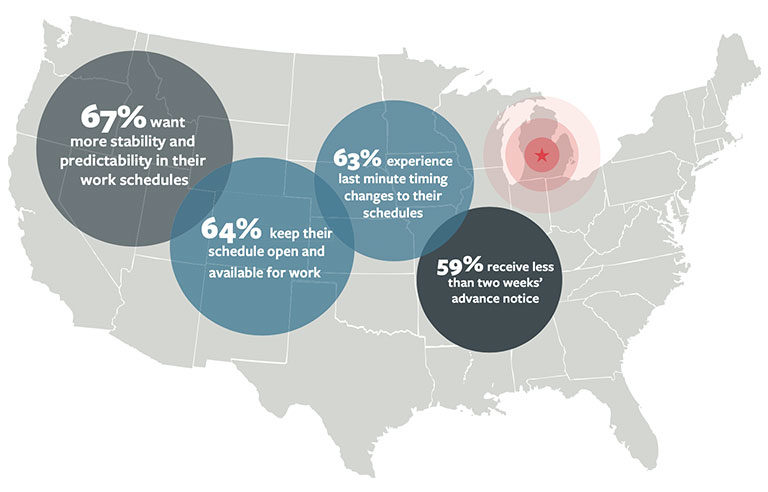Unpredictable schedules adversely affect worker well-being: report

Photo: The Shift Project at Harvard University
Lansing, MI — Service sector workers with irregular schedules often experience greater levels of stress and exhaustion, according to a recent report.
Based on a survey of nearly 5,400 service sector workers in Michigan conducted by researchers at The Shift Project at Harvard University on behalf of the state’s Department of Labor and Economic Opportunity, the report spotlights the adverse effects of employers’ unpredictable scheduling practices on their employees.
The workers indicated that the biggest challenges presented by their unpredictable schedules are:
- Poor or fair sleep quality (78%)
- Difficulty getting needed time off (71%)
- Struggles dealing with family or personal matters at work (71%)
- Difficulty paying bills (67%)
- Unhappiness (48%)
- Frequent psychological distress (42%)
Many service sector employers, according to the researchers, rely on “just in time” and on-call scheduling to minimize labor costs by aligning staffing with consumer demand. Yet, for workers, these practices create instability in their lives.
The report notes that labor laws regulating work schedules are becoming more common in some cities and states. In Michigan, for instance, H.B. 4035 – introduced in January – would require certain employers to provide written work schedules to workers and allow employees to request changes.
“The unstable and erratic work schedules that so many hourly workers in the service sector in Michigan cope with lead to all-too-predictable consequences for their health, well-being and economic security,” report co-author Daniel Schneider, a social policy professor at Harvard, said in a press release. “Our work and hour regulations simply haven’t kept up with the reality of these scheduling practices, and workers need basic guardrails to protect them against the most pernicious practices.”
In January, Michigan’s Department of Labor and Economic Opportunity launched a monthly webinar series in an effort to encourage discussions on investing in mental health to build stronger, more resilient workplaces. LEO also recently launched Mental Health in the Workplace – an online hub with various resources and tools for workers and their employers.
Post a comment to this article
Safety+Health welcomes comments that promote respectful dialogue. Please stay on topic. Comments that contain personal attacks, profanity or abusive language – or those aggressively promoting products or services – will be removed. We reserve the right to determine which comments violate our comment policy. (Anonymous comments are welcome; merely skip the “name” field in the comment box. An email address is required but will not be included with your comment.)

